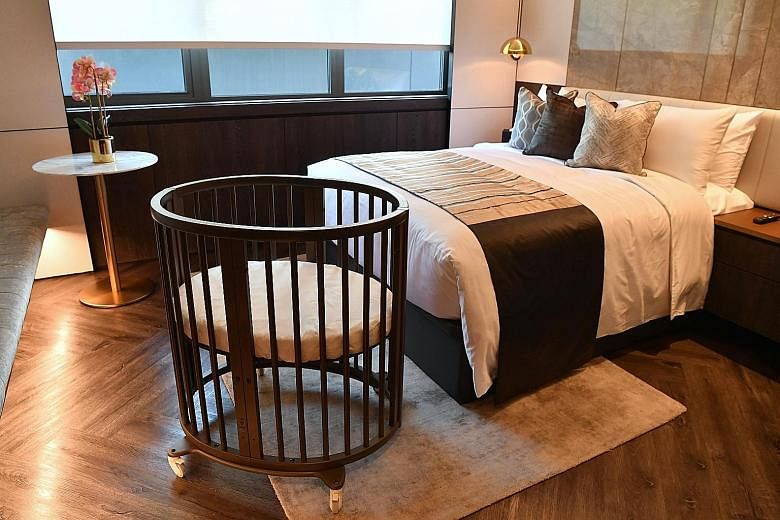Expectant mothers can look forward to being pampered at what is billed as Singapore's first dedicated postnatal care facility.
Kai Suites, which launched last month, is billed as a one-stop pre-and post-partum care retreat. And it could not have opened at a more opportune time, with many confinement nannies from Malaysia unable to travel here with the border closures.
It occupies a conserved state property in Dunearn Road near Newton Circus that was formerly home to the Singapore Family Planning and Population Board and Breast Cancer Foundation.
The beautifully preserved building now houses 18 modern suites where mothers can stay with their babies after delivering. There is also a nursery, a dining room and lounges where guests can socialise.
A spa and an aesthetics centre will open next month.
The company won the tender from the Singapore Land Authority two years ago and modelled the facility after other high-end confinement facilities in places such as Taiwan, China and South Korea.
Those include the luxurious Ma Cherie or Xiyue Postpartum Nursing Home in Taipei, where Taiwanese superstar Jay Chou's wife, model-actress Hannah Quinlivan, reportedly stayed following the birth of their daughter in July 2015.
At Kai Suites, a lot of care is taken to make sure its guests are well cared for. Its spokesman says it practises the Japanese concept of omotenashi, which pays attention to little details. Kai in Japanese means restoration and recovery, while in Chinese it means triumph.
Its 14 deluxe suites and four premium suites are like five-star hotel rooms in soothing natural tones, except for the extra call button for nurses. They are furnished with queen-and king-size beds as fathers are encouraged to stay over while bassinets are provided for the babies. There is also a full-size refrigerator to store food for the fathers and milk for the babies.
Wooden tubs and stools are thoughtfully placed in the attached bathrooms for herbal baths. Nurses can feed the babies, including with stored breast milk, if the mums choose to sleep through the night.
-
ELSEWHERE IN ASIA
Taiwan There are hundreds of post-partum centres in Taiwan, including the upmarket Ma Cherie or Xiyue Postpartum Nursing Home that was founded in 1995 and now runs six facilities in Taipei and one in Hsinchu. They provide care for the baby and mother including confinement meals. The centre's website does not list prices, but it reportedly costs about NT$12,000 (S$570) a night with three meals.
China According to the Legal Daily newspaper, there are more than 4,000 post-partum centres in China, up from just dozens 20 years ago. In big cities like Shanghai, a month's stay in a centre that resembles a five-star hotel can cost up to 70,000 yuan (S$14,300).
South Korea Postnatal centres are so common in the country that a 2017 report in the Korea Biomedical Review estimates that six out of every 10 South Korean mothers use them.
The more luxurious ones offer massages, spas and even cosmetic surgery. A suite in the upscale Gangnam area in Seoul can cost about 10 million won (S$12,300) for two weeks.
There is also a nursery, with each cot fitted with a camera for the mother to monitor her baby on her smartphone. It is staffed by experienced nurses in pre-and postnatal care who also conduct workshops on subjects like handling the baby and breastfeeding.
An important part of confinement care, especially for Chinese Singaporeans, is the diet for new mummies, so it is not surprising that Kai Suites pays a good deal of attention to this.
It engaged food consultant David Yip to work with its team of four young, Western-trained chefs to come up with a special menu for its residents.
He says they have come up with more than 500 recipes that are inspired by Chinese, Japanese and Korean dishes and cooked using Western techniques. Chefs of Michelin-starred restaurants such as Han Li Guang of Restaurant Labyrinth, Tomoo Kimura of Sushi Kimura and Thitid Tassanakajohn (Ton) of Le Du in Bangkok also contributed some recipes.
Hardly any dish is repeated for every one of the six daily meals during a guest's stay.
Mr Yip adds: "Unlike at a hotel where a guest stays for just a few days, ours are here for a long time."
But those who crave certain dishes can request for them. There is also an a la carte menu of popular dishes like braised pork trotter and egg in black sweet vinegar.
The meals are planned in consultation with nutritionists and traditional Chinese medicine (TCM) practitioners to cater to the mothers' body conditions after delivering.
Meals for the first week are usually lighter and comprise mainly steamed items, while those for week four can include fried dishes. For example, a main course for the first week is steamed chicken that is lightly grilled for flavour and glazed with tomato consomme and flavoured with a few drops of housemade tomato oil.
But TCM practitioners also monitor the mothers to make sure the dishes are suitable for them.
Mr Yip adds: "The challenge is also in making everything in-house instead of using commercial sauces. We make our own oyster sauce and syrups that are used in place of refined sugar."
The kitchen also uses hormone-and antibiotic-free Anxin chicken and does not use plastic containers or aluminium foil or cookware.
All this does not come cheap. The facility is offering an introductory rate of $25,000 for a 28-day stay in a deluxe suite, including meals for the mother but not the father. There is also an option for a 14-day stay followed by 14-day nursing care at home for $20,800. That includes delivered meals to the mother. For those interested in the meals only, there is a 28-day programme with two home-delivered meals daily for $3,500.
There are also the extras. The spa opening next month will provide treatments like massages and wraps, while the aesthetics centre is equipped with machines for body contouring and skin tightening.
On whether the prices will be a deterrent, the spokesman says: "What you pay is equivalent to an expensive holiday, but it's an experience for only a few times in your life."



